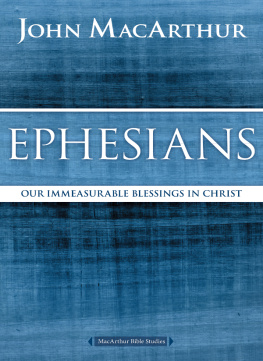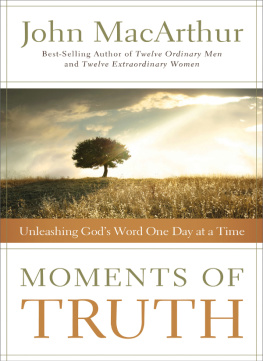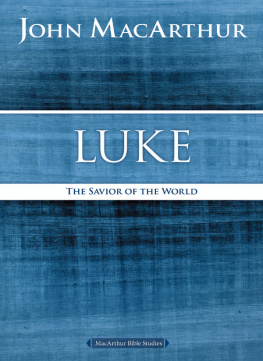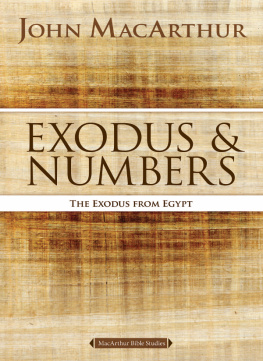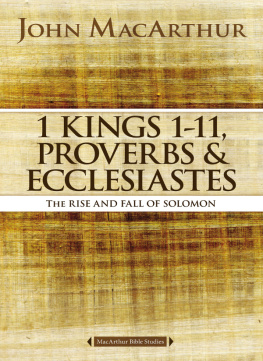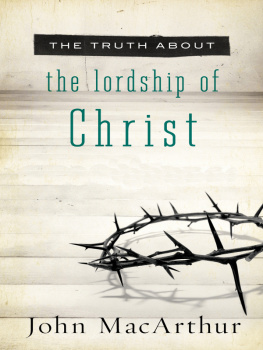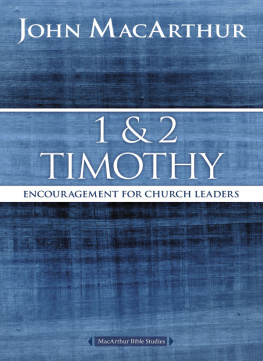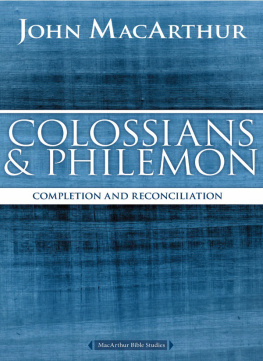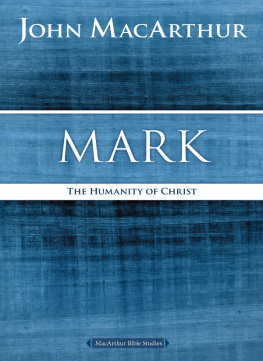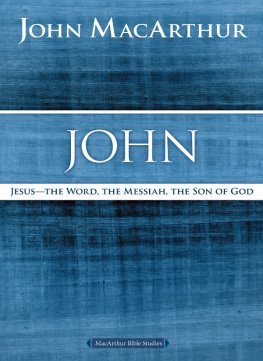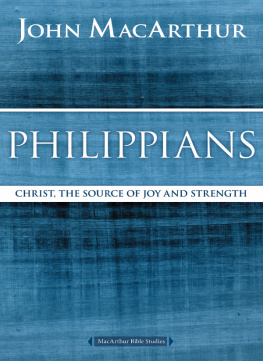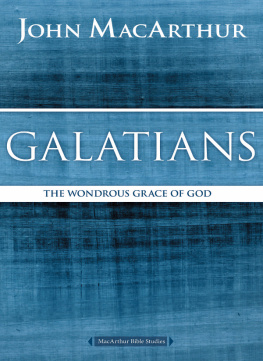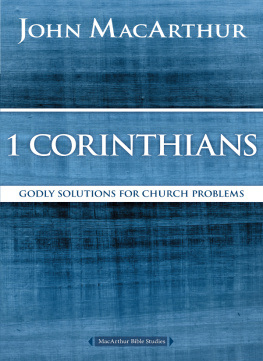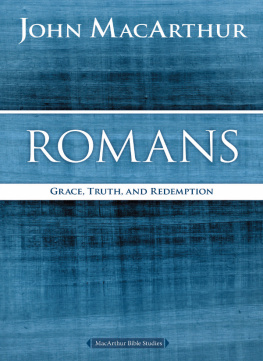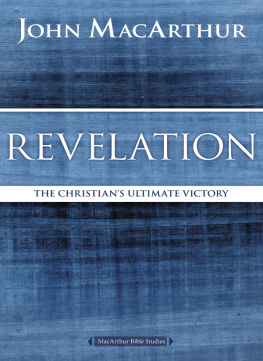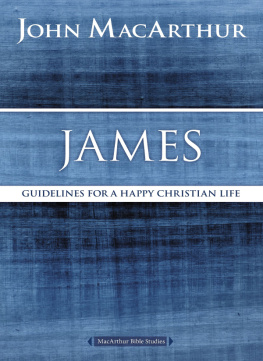EPHESIANS
MACARTHUR BIBLE STUDIES
2007, John F. MacArthur, Jr.
All rights reserved. No portion of this book may be reproduced, stored in a retrieval system, or transmitted in any form or by any meanselectronic, mechanical, photocopy, recording, or any otherexcept for brief quotations in printed reviews, without the prior permission of the publisher.
John MacArthur
Unleashing Gods Truth, One Verse at a Time
Unleashing Gods Truth, One Verse at a Time is a trademark of Grace to You. All rights reserved.
Published in Nashville, Tennessee, by Nelson Books, an imprint of Thomas Nelson. Nelson Books and Thomas Nelson are registered trademarks of HarperCollins Christian Publishing, Inc.
Nelson Books titles may be purchased in bulk for education, business, fundraising, or sales promotional use. For information, please email SpecialMarkets@ThomasNelson.com
Published in association with the literary agency of Wolgemuth & Associates, Inc.
Produced with the assistance of the Livingstone Corporation. Project staff include Jake Barton, Betsy Todt Schmitt, and Andy Culbertson. Project editors: Mary Horner Collins, Amber Rae, and Len Woods.
Scripture quotations marked NKJV are taken from the The New King James Version. 1982 by Thomas Nelson, Inc. Used by permission. All rights reserved.
Truth for Today material taken from:
Alone with God. 1995 by John MacArthur, Jr. Victor Books: Wheaton, Illinois. Used by permission.
Romans. MacArthur New Testament Commentary Series. 1996 by John MacArthur. Published by Moody Press: Chicago, Illinois. Used by permission.
The God Who Loves. 1996, 2003 by John MacArthur, Jr. Published by Thomas Nelson Publishers.
Keys to the Text material taken from the following sources:
The MacArthur Study Bible (electronic ed.). John MacArthur, General Editor. 1997 by Word Publishing. All rights reserved. Used by permission.
Galatians: MacArthur New Testament Commentary Series. 1987, 1996 by John MacArthur. Published by Moody Press, Chicago, Illinois. Used by permission.
1 Corinthians: MacArthur New Testament Commentary Series. 1984, 1996 by John MacArthur. Published by Moody Press: Chicago, Illinois. Used by permission.
Nelsons New Christian Dictionary. George Thomas Kurian, Editor. 2001 by Thomas Nelson, Inc.
Anxiety Attacked. 1993, 1996 by John MacArthur, Jr. Victor Books: Wheaton, Illinois. Used by permission.
Alone with God. 1995 by John MacArthur, Jr. Victor Books: Wheaton, Illinois. Used by permission.
Cover Art by Holly Sharp Design
Interior Design and Composition by Joel Bartlett, Livingstone Corporation
ISBN: 978-0-7180-3510-5
ISBN: 978-0-7180-3529-7 (eBook)
15 16 17 18 19 RRD 6 5 4 3 2 1
CONTENTS
The letter is addressed to the church in the city of Ephesus, capital of the Roman province of Asia (Asia Minor, modern Turkey). Because the name Ephesus is not mentioned in every early manuscript of this letter, some scholars believe the letter was an encyclical, intended to be circulated and read among all the churches in Asia Minor and was simply sent first to believers in Ephesus.
AUTHOR AND DATE
No evidence has arisen for questioning Pauls authorship. He is indicated as author in the opening salutation (1:1; 3:1). Written from prison in Rome (Acts 28:1631) sometime between AD 6062, the letter is, therefore, often labeled a prison epistle (along with Philippians, Colossians, and Philemon). Ephesians may have been composed almost at the same time as Colossians and initially sent with that epistle and Philemon by Tychicus (6:2122; Col. 4:78).
BACKGROUND AND SETTING
The gospel probably was first brought to Ephesus by Priscilla and Aquila, an exceptionally gifted couple (see Acts 18:26), who had been left there by Paul on his second missionary journey (Acts 18:1819). Located at the mouth of the Cayster River, on the east side of the Aegean Sea, Ephesus was perhaps best known for its magnificent temple of Artemis, or Diana, one of the seven wonders of the ancient world. It was also an important political, educational, and commercial center, ranking with Alexandria in Egypt and Antioch of Pisidia, in southern Asia Minor.
Later, Paul firmly established this fledgling church on his third missionary journey (Acts 19), and he pastored it for some three years. After Paul left, Timothy pastored the congregation for perhaps a year and a half, primarily to counter the false teaching of a few influential men (such as Hymenaeus and Alexander), who were probably elders in the congregation there (1 Tim. 1:3, 20). Because of those men, the church at Ephesus was plagued by fables and endless genealogies (1 Tim. 1:4) and by such ascetic and unscriptural ideas as the forbidding of marriage and abstaining from certain foods (1 Tim. 4:3). Although those false teachers did not rightly understand Scripture, they propounded their ungodly interpretations with confidence (1 Tim. 1:7), which produced in the church harmful disputes rather than godly edification which is in faith (1 Tim. 1:4). About thirty years later, Christ gave the apostle John a letter for the church indicating that its people had left their first love for Him (Rev. 2:17).
HISTORICAL AND THEOLOGICAL THEMES
The first three chapters are theological, emphasizing New Testament doctrine, whereas the last three chapters are practical and focus on Christian behavior. Above all, this is a letter of encouragement and admonition, written to remind believers of their immeasurable blessings in Jesus Christ, not only to be thankful for those blessings, but also to live in a manner worthy of them. Despite, and partly even because of, Christians great blessings in Jesus Christ, they are sure to be tempted by Satan to self-satisfaction and complacency. Thus, in the last chapter, Paul reminds believers of the full and sufficient spiritual armor supplied to them through Gods Word and by His Spirit (6:1017) and of their need for vigilant and persistent prayer (6:18).
A key theme of Ephesians is the mystery (meaning a heretofore unrevealed truth) of the churchthat the Gentiles should be fellow heirs, of the same body, and partakers of His promise in Christ through the gospel (3:6), a truth completely hidden from the Old Testament saints (3:5, 9). All believers in Jesus Christ, the Messiah, are equal before the Lord as His children and as citizens of His eternal kingdom, a marvelous truth that only believers of this present age possess. Paul also speaks of the mystery of the church as the bride of Christ (5:32; Rev. 21:9). Paul emphasizes the major truth that the church is Christs present spiritual, earthly body, also a distinct and formerly unrevealed truth about Gods people. This metaphor depicts the church not as an organization, but as a living organism composed of mutually related and interdependent parts. Christ is Head of the body, and the Holy Spirit is its lifeblood. The body functions through the faithful use of its members various spiritual gifts, sovereignly and uniquely given by the Holy Spirit to each believer.
Another prominent theme is the riches and fullness of blessing to believers. Paul writes of the riches of His [Gods] grace (1:7), the unsearchable riches of Christ (3:8), and the riches of His glory (3:16). Paul admonishes believers to be filled with all the fullness of God (3:19), to come to the unity of the faith and of the knowledge of the Son of God, to a perfect man, to the measure of the stature of the fullness of Christ (4:13), and to be filled with the Spirit (5:18). Believers riches in Christ are based on Gods grace (1:2, 67; 2:7), peace (1:2), will (1:5), pleasure and purpose (1:9), glory (1:1214), calling and inheritance (1:18), power and strength (1:19; 6:10), love (2:4), workmanship (2:10), Holy Spirit (3:16), offering and sacrifice (5:2), and armor (6:1113). The word riches is used five times in the letter; grace is used twelve times; glory eight times, fullness or filled six times; and the key phrase in Christ (or in Him) twelve times.
Next page
